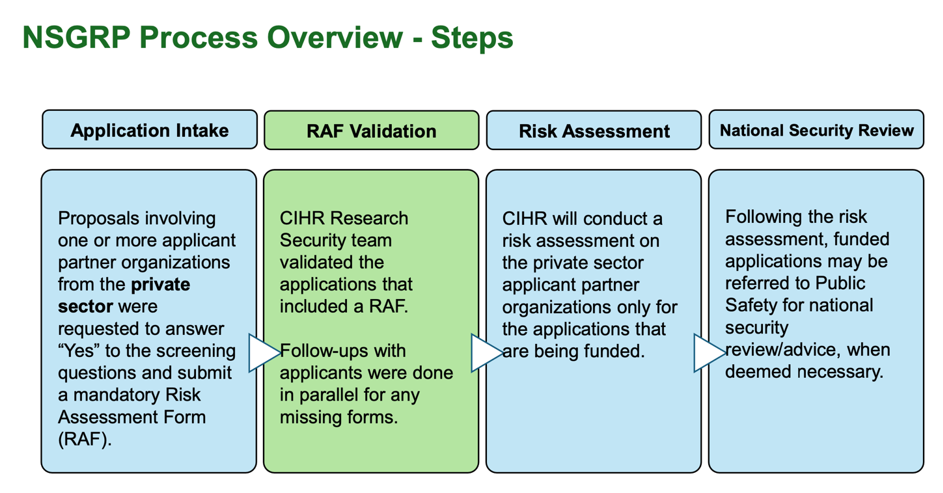Funding, News and Announcements
» Go to news mainUniversity Delegates
Tri-Agency CV
The Tri-Agency CV is a narrative style CV that will replace the CCV.╠ř The will continue to be piloted in select competitions in Spring 2025.╠ř CIHR, NSERC and SSHRC are meeting to review and incorporate feedback from applicants, reviewers, chairs and SOs. The TCV will NOT be used in Spring 2025 CIHR Projects Grants.
Budget Update 2024
Beginning in 2024-2025, the federal budget 2024 provided $1.8 billion over five years to the federal granting councils to support existing core research programs. It also designated an extra $748 million annually in the years to follow.╠ř Of the $1.8 billion investment, CIHR will receive $540.3 million over five years (2024-25 to 2028-29), with $229.2 million per year ongoing, will be provided to CIHR.
CIHR knows that the communityÔÇÖs biggest priority is ensuring stable funding for investigator-initiated research, and these new funds will help strengthen the Project Grant program. CIHRÔÇÖs intention is that this additional funding will allow us to both increase the number of grants supported through the Project Grant program and increase the average budget size for Project grants. In doing so, CIHR will provide for the new, higher rates to pay trainees a living wage, in line with the increased award values of tri-agency scholarships and fellowships.
National Security Guidelines for Research Partnerships (NSGRP) Data - Fall 2024 Project Grant

╠ř
A Risk Assessment Form (RAF) is only required from applicants when the proposal involves one or more applicant partner organization(s) from the private sector. For the NSGRP, a partner organization is any organization that plays an active role in the project and/or supports a research partnership through cash and/or in-kind contributions. Read more on .
Project Grants Update
Application pressure to Fall 2024 project grants are increased relative to previous competitions.╠ř 3069 registrations were submitted in Aug 2024.╠ř 2634 completed applications were submitted mid-September 2024.╠ř The average request for funding was $1,144, 987.╠ř Overall, applications per committee were increased with increased applications by ECR and SCRs but fewer MCR applications.╠ř The applications from women were increased slightly with more women applying to Pillar 3 and 4 compared to Pillar 1 and 2.╠ř CIHR continues to monitor application pressure and funding pilipili┬■╗ş by gender, career stage, committee, pillar and language but does not consider regional differences in funding pilipili┬■╗ş.
Changes to Notice of Recommendation and Decision.
There will be changes in the reporting on Project Grant Notice of Recommendation and Notice of Decisions. Applicants will not be informed of their rank within the committee but will be informed of the funding ÔÇťzoneÔÇŁ that the final scores fall into. The zones will be top 90-100%, 75-90%, 50-75%, 25-50% or 0-25%.╠ř Additional notes regarding formatting errors will be provided on Notice of Recommendation.
Applicants in the 75-90% zone at the Notice of Recommendation may or may not be funded.╠ř Priority announcements results will be provided on Notice of Decision.
Information about the Tri-Agency Cap Stone project is not yet available.
Important CIHR dates:
Fall Notice of Recommendation (NOR):╠ř╠ř
Jan 15, 2025╠ř-using funding zones instead of rank
Fall Anticipated Notice of Decision (NOD): ╠ř╠ř╠ř╠ř╠ř╠ř╠ř╠ř╠ř╠ř
Jan 29, 2025
Funding Start Date: ╠ř╠ř╠ř╠ř╠ř╠ř╠ř╠ř╠ř╠ř╠ř╠ř╠ř╠ř╠ř╠ř╠ř╠ř╠ř╠ř╠ř╠ř╠ř╠ř╠ř╠ř╠ř╠ř╠ř╠ř╠ř╠ř╠ř╠ř╠ř╠ř╠ř╠ř╠ř╠ř╠ř╠ř╠ř╠ř╠ř╠ř╠ř╠ř╠ř╠ř
April 1, 2025
Spring Registration╠ř╠ř╠ř╠ř╠ř╠ř╠ř╠ř╠ř╠ř╠ř╠ř╠ř╠ř╠ř╠ř╠ř╠ř╠ř╠ř╠ř╠ř╠ř╠ř╠ř╠ř╠ř╠ř╠ř╠ř╠ř╠ř╠ř╠ř╠ř╠ř╠ř╠ř╠ř╠ř╠ř╠ř╠ř╠ř╠ř╠ř╠ř╠ř╠ř╠ř╠ř
Feb 5, 2025
Spring Deadline╠ř╠ř╠ř╠ř╠ř╠ř╠ř╠ř╠ř╠ř╠ř╠ř╠ř╠ř╠ř╠ř╠ř╠ř╠ř╠ř╠ř╠ř╠ř╠ř╠ř╠ř╠ř╠ř╠ř╠ř╠ř╠ř╠ř╠ř╠ř╠ř╠ř╠ř╠ř╠ř╠ř╠ř╠ř ╠ř╠ř╠ř╠ř╠ř╠ř╠ř╠ř╠ř╠ř╠ř╠ř╠ř
March 5, 2025
Spring Notice of Recommendation (NOR): ╠ř╠ř╠ř╠ř╠ř╠ř╠ř╠ř╠ř╠ř
July 3, 2025
Spring Anticipated Notice of Decision (NOD): ╠ř╠ř╠ř╠ř╠ř
July 17, 2025
Funding Start Date╠ř╠ř╠ř╠ř╠ř╠ř╠ř╠ř╠ř╠ř╠ř╠ř╠ř╠ř╠ř╠ř╠ř╠ř╠ř╠ř╠ř╠ř╠ř╠ř╠ř╠ř╠ř╠ř╠ř╠ř╠ř╠ř╠ř╠ř╠ř╠ř╠ř╠ř╠ř╠ř╠ř╠ř╠ř╠ř╠ř╠ř╠ř╠ř╠ř╠ř╠ř╠ř
Oct 1, 2025
Reminder:╠řResearchNet keeps a list of Current Funding Opportunities and Priority Announcements.╠ř
Recent News
- Funding Deadline Calendar ÔÇô 2025 Spring/Summer Update
- Monthly CIHR University Delegates Meeting Minutes
- Safeguarding Science Webinars
- IRAP Science and Technology Assistance Program
- Brain Canada Foundation
- ACENET
- Research Nova Scotia
- Mawkwil~mn~j: LetÔÇÖs Look for It Together
